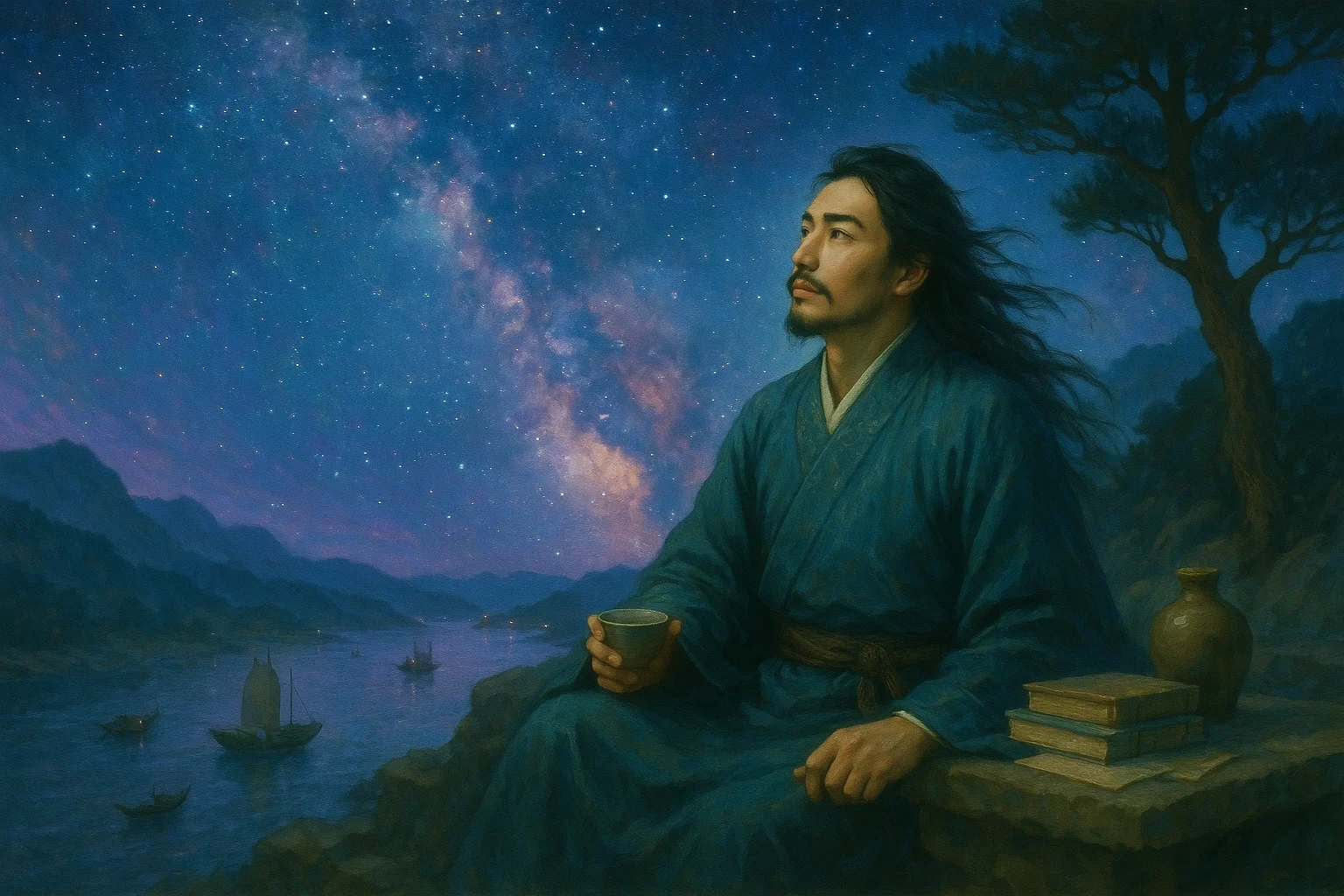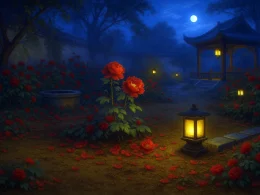Your riotous hues assault the sky—
Too dazzling for close scrutiny.
Yet your faint fragrance sweeps the ground,
A scent that haunts from far around.
The spring wind, too, feels love’s sweet smart,
And breaks your bushiest branch apart,
Then sends it drifting down to me—
A torn bouquet from earth’s own tree.
Original Poem
「游城南十六首 · 风折花枝」
韩愈
浮艳侵天难就看,清香扑地只遥闻。
春风也是多情思,故拣繁枝折赠君。
Interpretation
This poem, part of a series composed during Han Yu's exile in Yangshan or Chaozhou (early 9th century), captures the poet's complex emotional landscape after political downfall. Written during an excursion south of the city walls, it employs floral imagery to meditate on the elusiveness of beauty and fulfillment—a subtle allegory for the scholar-official's thwarted ambitions. The work oscillates between sensory immediacy and philosophical detachment, embodying Han Yu's characteristic fusion of lyrical grace and intellectual rigor.
First Couplet: "浮艳侵天难就看,清香扑地只遥闻。"
Fú yàn qīn tiān nán jiù kàn, qīngxiāng pū dì zhǐ yáo wén.
Blossoms blaze so fiercely they drown the sky—unapproachable; / Their pure scent carpets the earth—only to be inhaled from afar.
The lines establish a paradox of proximity: visual splendor ("blaze," "drown the sky") overwhelms yet remains untouchable, while fragrance ("pure scent"), though pervasive, offers no tangible connection. This sensory dissonance mirrors the exiled scholar's predicament—surrounded by cultural ideals (Confucian "fragrance") yet barred from political realization (unreachable "blaze").
Second Couplet: "春风也是多情思,故拣繁枝折赠君。"
Chūnfēng yě shì duō qíng sī, gù jiǎn fán zhī zhé zèng jūn.
Even the spring wind grows sentimental— / Snapping a laden branch to gift you.
Here, nature intervenes as emotional surrogate: the personified wind ("sentimental") attempts to bridge the human-nature divide through violent generosity ("snapping"). This gesture, both tender and destructive, encapsulates Han Yu's ambivalence—is the wind a benevolent force delivering beauty, or an agent of inevitable decay? The "laden branch" becomes a double-edged symbol: a fleeting consolation prize and a reminder of all that cannot be possessed.
Holistic Appreciation
On the surface, this poem depicts a spring scene where fragrant branches, broken by the wind, are offered as a gift—yet beneath lies profound allegory. Amid blooming splendor, the poet laments beauty’s elusive proximity: the well-intentioned spring breeze both destroys and bestows. The "floating glamour" and "clear fragrance" serve as symbols—perhaps of fleeting beauty, unfulfilled ideals, unrecognized talent, or political fortune—while "hard to approach" and "only faintly perceived" hint at brilliance unseen by the world. A fleeting natural moment becomes a meditation on fate, where light words carry deep emotion and simple scenes hold grand meaning, epitomizing Han Yu’s art of embedding philosophy in nature and emotion in objects.
Artistic Merits
- Laconic Language, Philosophical Depth:
Though concise, each line resonates with contemplation. Symbols like "floating glamour," "fragrance," and the "spring breeze" construct a natural tableau both real and personified, amplifying poetic resonance. - Tight Composition, Layered Transitions:
In just four lines, the poem moves from scenery to sentiment, observation to insight. The "breeze breaking branches"—a gesture both tender and violent—embodies Han Yu’s signature irony and ambiguity. - Subtlety in Weighty Themes:
His ability to cloak profound emotions in understatement, compressing life’s joys and sorrows into a single phrase, reveals masterful literary depth and lived wisdom.
Insights
This poem reminds us that beauty often lingers just beyond reach—like ideals and affections that waver before we grasp them. Through the image of wind-snapped blossoms, Han Yu voices an understanding of loss and impermanence, yet also offers solace in gentle acceptance. He teaches that even when life denies us wholeness, we might still cherish the breeze’s unintended "gift" of scattered petals, finding shards of tenderness and hope amid fragmentation.
About the Poet

Han Yu (韩愈, 768 - 824), originario de Mengzhou en Henan, fue el líder del Movimiento de la Prosa Antigua durante la dinastía Tang. Obtuvo el título de jinshi en 792 y ascendió al cargo de Viceministro de Personal. Su prosa es vigorosa y poderosa, mientras que su poesía se caracteriza por un estilo audaz y poco convencional. Su poema Rocas de la Montaña (山石) inauguró la técnica de "prosificar la poesía". Fue mentor de poetas como Meng Jiao y Jia Dao, y es considerado el principal de los "Ocho Grandes Maestros de la Prosa de Tang y Song". Sus contribuciones revolucionarias a la literatura tuvieron una influencia profunda y duradera, lo que le valió el título honorífico de "Maestro Literario de las Generaciones".












